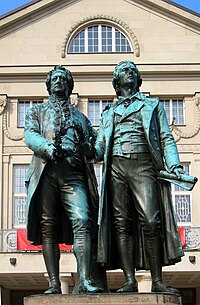Friedrich Schiller
German playwright, poet, philosopher and historian (1759–1805)
(Redirected from Schiller)
Johann Christoph Friedrich von Schiller (November 10, 1759 in Marbach, Württemberg – May 9, 1805 in Weimar), usually known as Friedrich Schiller, was a German poet, philosopher, historian, and dramatist.


Works
changePlays
change- Die Räuber (The Robbers) (1781)
- Kabale und Liebe (Intrigue and Love) (1784)
- Don Carlos, Infant von Spanien (Don Carlos) (1787)
- Wallenstein (1800)
- Die Jungfrau von Orleans (The Maid of Orleans) (1801)
- Maria Stuart (Mary Stuart) (1801)
- Turandot (1802)
- Die Braut von Messina (1803)
- Wilhelm Tell (William Tell) (1804)
- Demetrius (unfinished at his death)
Poems
change- An die Freude or Ode to Joy (1785) which became the basis for the fourth movement of Beethoven's ninth symphony
- The Artists
- The Cranes of Ibykus
- The Bell
- Columbus
- Hope
- Pegasus in Harness
- The Glove
- Nänie which Brahms set to music
Other websites
changeWikimedia Commons has media related to Friedrich Schiller.
Wikiquote has a collection of quotations related to: Friedrich Schiller
Wikisource has original writing related to this article:
- Works by Friedrich Schiller at Project Gutenberg
- Friedrich Schiller Chronology
- "Say it loud – it's Schiller and it's proud" by George Steiner
- 2005 is Schiller year: all dates
- Letters upon the Education of Man at [1]
- Schiller Monument in Schiller Park, German Village, Columbus, Ohio, USA Archived 2005-03-14 at the Wayback Machine[2] Archived 2005-10-23 at the Wayback Machine
- Schiller multimedial Archived 2019-03-01 at the Wayback Machine combines a biographical observation by Norbert Oellers with classic recordings and video clips
- Mobile Schiller Archived 2005-11-19 at the Wayback Machine Mobile Java application containing 20 poems of Schiller